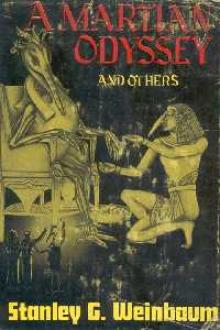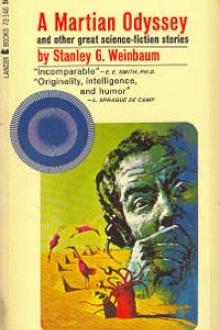Short Fiction, Stanley G. Weinbaum [chromebook ebook reader .TXT] 📗

- Author: Stanley G. Weinbaum
Book online «Short Fiction, Stanley G. Weinbaum [chromebook ebook reader .TXT] 📗». Author Stanley G. Weinbaum
“Yes,” said van Manderpootz. “I’ve dismantled it. One of van Manderpootz’s few mistakes was to leave it around where a pair of incompetents like you and Denise could get to it. It seems that I continually overestimate the intelligence of others. I suppose I tend to judge them by the brain of van Manderpootz.”
I said nothing. I was thoroughly disheartened and depressed, and whatever the professor said about my lack of intelligence, I felt it justified.
“Hereafter,” resumed van Manderpootz, “I shall credit nobody except myself with intelligence, and will doubtless be much more nearly correct.” He waved a hand at Isaak’s vacant corner. “Not even the Bacon head,” he continued. “I’ve abandoned that project, because, when you come right down to it, what need has the world of a mechanical brain when it already has that of van Manderpootz?”
“Professor,” I burst out suddenly, “why won’t they let me see Denise? I’ve been at the hospital every day, and they let me into her room just once—just once, and that time she went right into a fit of hysterics. Why? Is she—?” I gulped.
“She’s recovering nicely, Dixon.”
“Then why can’t I see her?”
“Well,” said van Manderpootz placidly, “it’s like this. You see, when you rushed into the laboratory there, you made the mistake of pushing your face in front of the barrel. She saw your features right in the midst of all those horrors she had called up. Do you see? From then on your face was associated in her mind with the whole hell’s brew in the mirror. She can’t even look at you without seeing all of it again.”
“Good—God!” I gasped. “But she’ll get over it, won’t she? She’ll forget that part of it?”
“The young psychiatrist who attends her—a bright chap, by the way, with a number of my own ideas—believes she’ll be quite over it in a couple of months. But personally, Dixon, I don’t think she’ll ever welcome the sight of your face, though I myself have seen uglier visages somewhere or other.”
I ignored that. “Lord!” I groaned. “What a mess!” I rose to depart, and then—then I knew what inspiration means!
“Listen!” I said, spinning back. “Listen, professor! Why can’t you get her back here and let her visualize the ideally beautiful? And then I’ll—I’ll stick my face into that!” Enthusiasm grew. “It can’t fail!” I cried. “At the worst, it’ll cancel that other memory. It’s marvelous!”
“But as usual,” said van Manderpootz, “a little late.”
“Late? Why? You can put up your idealizator again. You’d do that much, wouldn’t you?”
“Van Manderpootz,” he observed, “is the very soul of generosity. I’d do it gladly, but it’s still a little late, Dixon. You see, she married the bright young psychiatrist this noon.”
Well, I’ve a date with Tips Alva tonight, and I’m going to be late for it, just as late as I please. And then I’m going to do nothing but stare at her lips all evening.
The Point of View“I am too modest!” snapped the great Haskel van Manderpootz, pacing irritably about the limited area of his private laboratory, glaring at me the while. “That is the trouble. I undervalue my own achievements, and thereby permit petty imitators like Corveille to influence the committee and win the Morell prize.”
“But,” I said soothingly, “you’ve won the Morell physics award half a dozen times, professor. They can’t very well give it to you every year.”
“Why not, since it is plain that I deserve it?” bristled the professor. “Understand, Dixon, that I do not regret my modesty, even though it permits conceited fools like Corveille, who have infinitely less reason than I for conceit, to win awards that mean nothing save prizes for successful bragging. Bah! To grant an award for research along such obvious lines that I neglected to mention them, thinking that even a Morell judge would appreciate their obviousness! Research on the psychon, eh! Who discovered the psychon? Who but van Manderpootz?”
“Wasn’t that what you got last year’s award for?” I asked consolingly. “And after all, isn’t this modesty, this lack of jealousy on your part, a symbol of greatness of character?”
“True—true!” said the great van Manderpootz, mollified. “Had such an affront been committed against a lesser man than myself, he would doubtless have entered a bitter complaint against the judges. But not I. Anyway, I know from experience that it wouldn’t do any good. And besides, despite his greatness, van Manderpootz is as modest and shrinking as a violet.” At this point he paused, and his broad red face tried to look violet-like.
I suppressed a smile. I knew the eccentric genius of old, from the days when I had been Dixon Wells, undergraduate student of engineering, and had taken a course in Newer Physics (that is, in Relativity) under the famous professor. For some unguessable reason, he had taken a fancy to me, and as a result, I had been involved in several of his experiments since graduation. There was the affair of the subjunctivisor, for instance, and also that of the idealizator; in the first of these episodes I had suffered the indignity of falling in love with a girl two weeks after she was apparently dead, and in the second, the equal or greater indignity of falling in love with a girl who didn’t exist, never had existed, and never would exist—in other words, with an ideal. Perhaps I’m a little susceptible to feminine charms, or rather, perhaps I used to be, for since the disaster of the idealizator, I have grimly relegated such follies to the past, much to the disgust of various ’vision entertainers, singers, dancers, and the like.
So of late I had been spending my days very seriously, trying wholeheartedly to get to the office on time just once, so that I could refer to it next time





Comments (0)